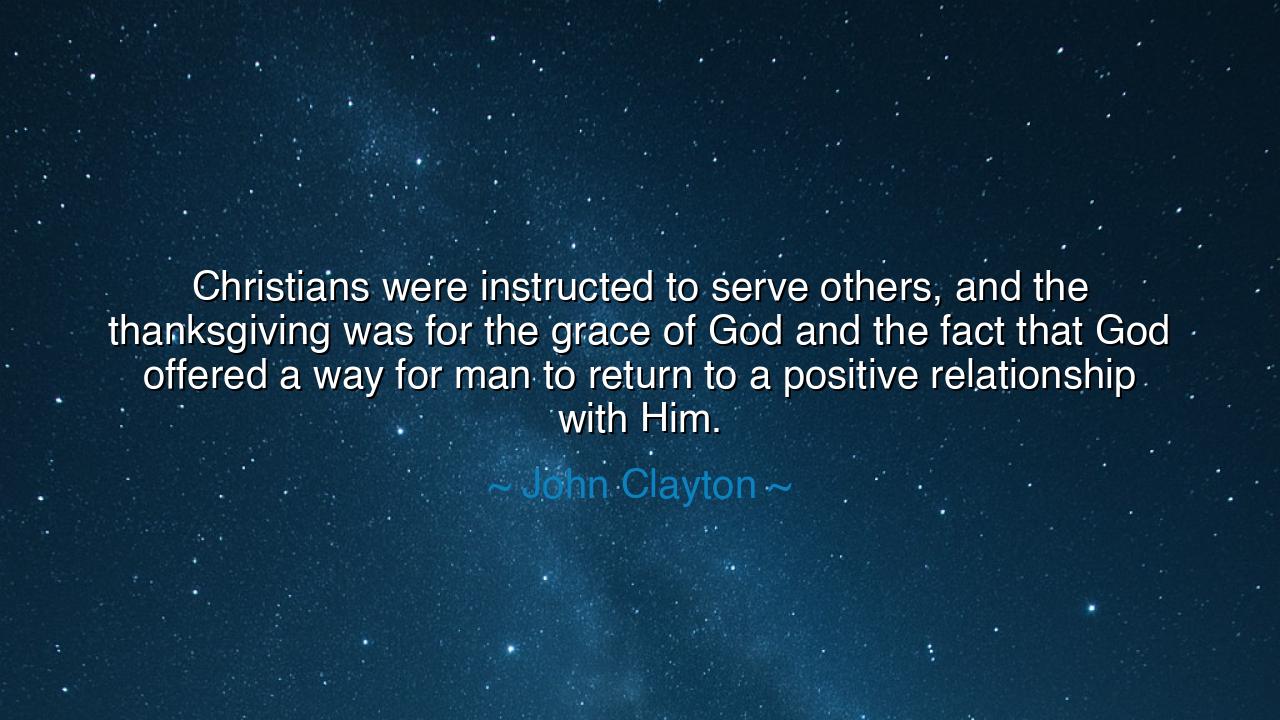
Christians were instructed to serve others, and the thanksgiving
Christians were instructed to serve others, and the thanksgiving was for the grace of God and the fact that God offered a way for man to return to a positive relationship with Him.






"Christians were instructed to serve others, and the thanksgiving was for the grace of God and the fact that God offered a way for man to return to a positive relationship with Him." In these words, John Clayton reminds us of the ancient roots of thanksgiving as not merely a celebration of harvest or abundance, but as an act of worship and service. The heart of his message is this: thanksgiving is not complete unless it flows outward, lifting both the soul toward God and the hand toward one’s neighbor. It is a holy rhythm of receiving grace and returning grace, of being blessed and becoming a blessing.
The origin of this teaching lies in the words of Christ Himself, who declared that "the Son of Man came not to be served, but to serve, and to give His life as a ransom for many." The early Christians took this instruction to heart. For them, thanksgiving was not merely a prayer over bread and wine, but a life of service rooted in gratitude for God’s grace. They believed that God, through Christ, had provided a way to restore the broken bond between Creator and creation, and the only fitting response was to serve others in love.
History gives us a shining example in the life of St. Francis of Assisi. He embraced poverty, cared for the sick, and served the outcasts, not because he sought glory, but because he was overwhelmed with thanksgiving for God’s mercy. His gratitude could not remain locked in his heart; it overflowed into deeds. For Francis, service was thanksgiving, and thanksgiving was service. He embodied Clayton’s teaching that gratitude for grace must move us into relationship—not only with God, but with the least of His children.
The meaning of Clayton’s words is also deeply tied to the true spirit of Thanksgiving Day in America. While the holiday is often seen as a harvest celebration, for many early settlers it was also an act of religious devotion. They gave thanks not only for survival but for the belief that Providence had preserved them, and they were called to live in obedience and service as a response. Their gratitude was not confined to words spoken at a table, but carried into how they treated one another and sought to build their communities.
There is also a heroic lesson here about the power of grace. Humanity, estranged from God by sin and selfishness, was not left abandoned. Instead, God extended a way back, a path of reconciliation. The knowledge of this gift stirred thanksgiving so profound that it could not remain hidden in the heart. It had to be expressed in song, in prayer, and in the service of others. For grace received must always become grace given; otherwise, it withers like seed left unplanted.
The lesson for future generations is clear: do not let thanksgiving be confined to feasts or fleeting words. Let it be rooted in the recognition of grace—that every breath, every blessing, every act of mercy is undeserved, yet freely given. Out of that recognition, serve others. Lift up the broken, feed the hungry, heal the sick, comfort the sorrowful. This is the truest thanksgiving: not the fullness of the table, but the fullness of the heart that overflows into action.
Practical action flows from this truth. Begin by naming the grace you have received—life, love, forgiveness. Then ask how you may turn those gifts outward. Volunteer to serve the poor, forgive a wrong, encourage the weary, or simply listen to one who is lonely. Let each act of service become a thanksgiving offering to God, a hymn sung not with words but with deeds. In this way, thanksgiving becomes not one day in November, but a way of life that honors the One who gave all.
Thus, Clayton’s words echo across time: thanksgiving is more than gratitude—it is grace received, grace remembered, and grace given. To serve others is to serve God, and to give thanks is to live reconciled with Him. Teach this to your children, and their lives will shine like lamps in the darkness, illuminating the world with the light of gratitude lived out as love.






AAdministratorAdministrator
Welcome, honored guests. Please leave a comment, we will respond soon